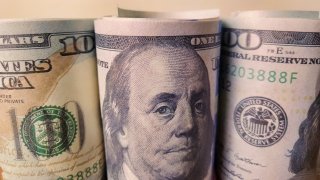Stock Market Crash Proves Federal Reserve Must Cut Interest Rates
We have to hope that the Federal Reserve realizes that today’s stock market weakness is unlikely to be a passing fad given the poor underlying world economic and political fundamentals.
Mark Twain is often credited with saying that history does not repeat itself, but it does often rhyme. He might well have been talking about the stock market’s repeated tendency to ignore deteriorating economic and political fundamentals. When it finally wakes up to this reality, it’s too late.
Something like this occurred in 2008 in the run-up to the 2008–2009 Great Economic Recession. And now, something similar seems to be occurring in the wake of last week’s disappointing U.S. employment report and the Bank of Japan’s surprise decision to raise interest rates. That latter rise has caused a spike in the Japanese yen that has caught many hedge funds off guard. Those hedge funds had been funding their large-scale purchases of U.S. tech companies with, up until now, cheap Japanese yen loans.
During the first half of 2008, the stock market experienced only a moderate decline. This was despite the clearest signs that the largest housing bubble in the country’s history had burst, the emergence of serious problems in the subprime market, and Bear Stearns’ failure in March 2008.
It was only after the Lehman bankruptcy in September 2008 that the market realized how complacent it had been about the housing and sub-prime credit market stresses that were in plain sight. When it did so, it lost around 50 percent in its value by March 2009.
Fast forward to today. This year, we have seen a stock market boom despite the fact that over the past two years, the Federal Reserve raised interest rates at the fastest pace in over a decade and despite the many signs of economic and political trouble at both home and abroad. One indication of that boom is the fact that the major stock market indices repeatedly scaled new heights, with the Dow Jones Industrial Average Index blowing past 40,000 and the S&P 500 Index blowing past 5,500. Another indication is the fact the stock market’s total capitalization reached the nosebleed level of almost 200 percent of GDP. That is around two standard deviations above its historical trend line.
If, in early 2008, the U.S. stock market was overly sanguine in the face of a domestic housing and sub-prime credit market problem, up until last week, it seems to have been overly optimistic about a host of economic and political problems both at home and abroad.
One of the problems to which the markets have turned a blind eye is the slow-motion train wreck that is now well underway in the U.S. commercial property market as more people work at least part of the time at home. Never mind that this problem has the potential of triggering another round of the regional bank crisis. Meanwhile, the market has chosen to ignore a substantial souring in the international economic outlook. Never mind that the Chinese economy, the world’s second-largest, is struggling with the bursting of an epic-sized housing and credit market bubble. Until very recently, Japan was battling the collapse of its currency, and a heavily indebted France now seems to be drifting towards political ungovernability, which could precipitate another round of the European sovereign debt crisis.
As if these economic problems were not reason enough for markets to have been more cautious, there are a number of political landmines in plain sight that could deal a significant blow to the U.S. and world economies. The Israel-Hamas war seems to be spreading to Iran, which could disrupt the world oil market. Meanwhile, at home, Donald Trump is threatening to introduce Smoot-Hawley-type import tariffs if he is re-elected, which could trigger a world trade war.
We have to hope that the Federal Reserve realizes that today’s stock market weakness is unlikely to be a passing fad given the poor underlying world economic and political fundamentals. Maybe then the Fed will do the right thing and start cutting interest rates aggressively to provide long-overdue support to a weakening U.S. economy.
About the Author: Desmond Lachman
Desmond Lachman is a Senior Fellow at the American Enterprise Institute and was a deputy director in the International Monetary Fund’s Policy Development and Review Department, and the chief emerging-market economic strategist at Salomon Smith Barney.
Image: Shutterstock.

